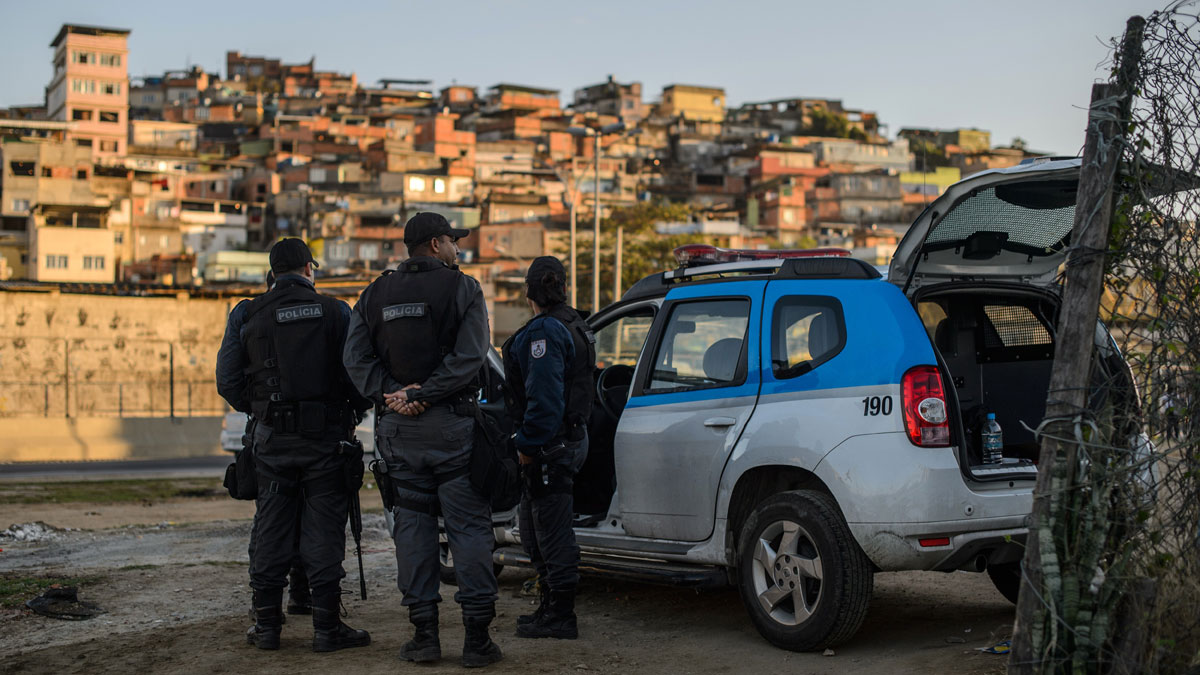Have Brazilian police gone rogue?
Gunmen killed 35 people in Manaus and suspicions are growing that police officers were involved

A free daily email with the biggest news stories of the day – and the best features from TheWeek.com
You are now subscribed
Your newsletter sign-up was successful
Last weekend, 35 people were killed in execution-style shootings by balaclava-wearing gunmen in the Brazilian city of Manaus. The suspected trigger for the killings was the murder of a military police sergeant – and some detectives are beginning to suspect their own men.
What is the background to the killings?
Gang crime is a serious problem in Manaus, one of Brazil's northern cities, as well as in the rest of the country. The city records two or three murders every day. According to a UN report, gun crime is a growing problem in Brazil, with gun killings now at their highest level for 35 years.
The Week
Escape your echo chamber. Get the facts behind the news, plus analysis from multiple perspectives.

Sign up for The Week's Free Newsletters
From our morning news briefing to a weekly Good News Newsletter, get the best of The Week delivered directly to your inbox.
From our morning news briefing to a weekly Good News Newsletter, get the best of The Week delivered directly to your inbox.
What happened last weekend?
Last Friday military police sergeant Afonso Camacho Dias was shot and killed when he left a bank after making a withdrawal. Over the next 72 hours, 35 people were killed, eight of whom held criminal records. While detectives now say that they have a suspect in connection with the sergeant's death, there are a number of theories about who is responsible for the rush of killings that followed.
Was it the police or a criminal gang?
Detectives investigating the case are certainly open to the suggestion that retaliating police officers, angry at the murder of their colleague, may be responsible for the deaths. According to The Guardian Orlando Amaral, the general director of the civil police, said the shootings were either linked to the death of the police officer, or could have been started in prison.
A free daily email with the biggest news stories of the day – and the best features from TheWeek.com
"We think it could either be related to the death of the sergeant, making these revenge killings, or a fight between rival gangs, which may have started in prison and spread to the city," he said. "We can't discard either hypothesis, and we're investigating both possibilities."
What are other sources saying?
Fabio Monteiro, the prosecutor general for the state of Amazonas (of which Manaus is the capital city), said that evidence pointed to the existence of a death squad within the police.
According to the New York Times, Monteiro said, "The agile modus operandi, involving arriving at the scene, making the kill and getting out, is typical of someone who knows what they're doing […] amateurs did not do this."
Is it likely that the police were involved?
In a word, yes. While Brazil has a population much smaller than that of the US, it has almost five times the number of killings by police. Death at the hands of police officers is one of the most prevalent instances of human rights abuse in Brazil with 2,212 police killings recorded in 2013.
The main reason for suspecting police involvement is the fact that at least eight of the victims had criminal records and were known to police. The attacks were also quite obviously coordinated with a number of groups taking part at the same time.
-
 The Olympic timekeepers keeping the Games on track
The Olympic timekeepers keeping the Games on trackUnder the Radar Swiss watchmaking giant Omega has been at the finish line of every Olympic Games for nearly 100 years
-
 Will increasing tensions with Iran boil over into war?
Will increasing tensions with Iran boil over into war?Today’s Big Question President Donald Trump has recently been threatening the country
-
 Corruption: The spy sheikh and the president
Corruption: The spy sheikh and the presidentFeature Trump is at the center of another scandal
-
 Epstein files topple law CEO, roil UK government
Epstein files topple law CEO, roil UK governmentSpeed Read Peter Mandelson, Britain’s former ambassador to the US, is caught up in the scandal
-
 Iran and US prepare to meet after skirmishes
Iran and US prepare to meet after skirmishesSpeed Read The incident comes amid heightened tensions in the Middle East
-
 Israel retrieves final hostage’s body from Gaza
Israel retrieves final hostage’s body from GazaSpeed Read The 24-year-old police officer was killed during the initial Hamas attack
-
 China’s Xi targets top general in growing purge
China’s Xi targets top general in growing purgeSpeed Read Zhang Youxia is being investigated over ‘grave violations’ of the law
-
 Panama and Canada are negotiating over a crucial copper mine
Panama and Canada are negotiating over a crucial copper mineIn the Spotlight Panama is set to make a final decision on the mine this summer
-
 Why Greenland’s natural resources are nearly impossible to mine
Why Greenland’s natural resources are nearly impossible to mineThe Explainer The country’s natural landscape makes the task extremely difficult
-
 Iran cuts internet as protests escalate
Iran cuts internet as protests escalateSpeed Reada Government buildings across the country have been set on fire
-
 US nabs ‘shadow’ tanker claimed by Russia
US nabs ‘shadow’ tanker claimed by RussiaSpeed Read The ship was one of two vessels seized by the US military